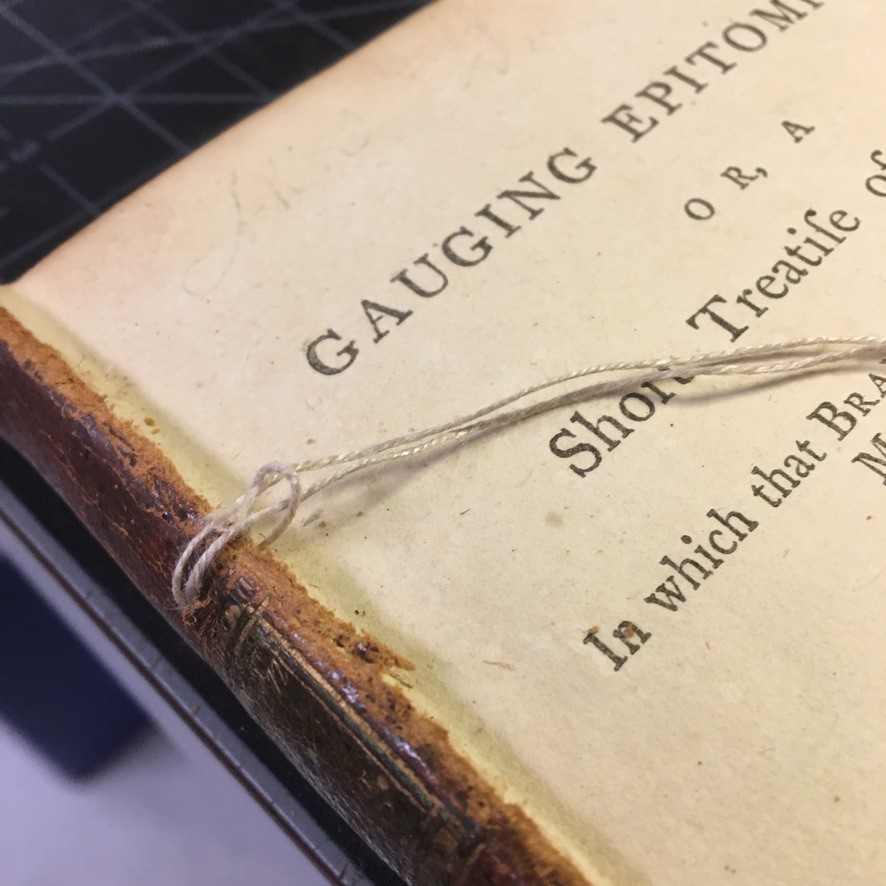In early March I attended a week-long workshop on the Conservation of Leather Bookbindings at the University Of Notre Dame in South Bend, Indiana. Early March, and particularly that week, marked a turning point in how the country was responding to the outbreak of Covid-19. When I left home on Sunday March 8, the only travel restrictions were to China, South Korea and Italy and social distancing was not yet mandated, although we were advised to practice frequent handwashing and for goodness sake, stop touching your face! By the time I returned, a National Emergency had been declared.

Monday, March 9th
The workshop was held in Hesburgh Libraries’ satellite conservation lab, a large, well-appointed space that easily accommodated nine participants and our instructor. We were warmly welcomed by the Head of Analog Preservation and Conservation Services who advised us that she would be practicing social distancing and urged us to please do the same for the health and safety of all participants.
Bookbinding and conservation are hands-on activities and intensive workshops that demonstrate techniques involve a lot of gathering around to view demonstrations and passing materials around for closer inspection. Under normal circumstances, this wouldn’t strike anyone as an outright hazard to ones’ health. So, in addition to a sink for handwashing, the lab space was generously stocked with hand sanitizer and disinfecting wipes which we were encouraged to use after handling anything passed between multiple hands.
The workshop focused primarily on the methods used to repair detached boards, as this is the most common problem for leather bindings. The techniques introduced were sewing extensions and tacketing, inner and outer hinge repairs, splitting and slotting of the boards, and leather re-backing.
Sewing extensions and tacketing are mechanical board reattachment techniques for tightbacks that are easily reversible and do not require the lifting of cover material or the removal of spine material. They are durable, less invasive overall, are relatively fast to perform and use inexpensive materials. However, the book needs to have a defined shoulder, strong paper, and the spine leather should be in relatively good shape. Extensions and tackets can cause inflexibility of the first few sections, so if the book is difficult to open, these may not be the best treatment options.
Tuesday, March 10th
One of my classmates receives a call announcing the shutdown of her daughter’s daycare as a precautionary method.
The class worked on methods around inner and outer hinge repairs which are minimally invasive, adhesive based repair techniques. They are quick, require no lifting of covering material, and can be toned to match existing materials. Hinge repairs are not as durable as a mechanical repair, they rely on the strength of the materials used as well as the condition of the materials they are applied to.
Wednesday, March 11th
Classmates are receiving texts that their home universities, including the University Of Notre Dame, are extending spring break indefinitely.
We worked through "on board" slotting and slitting, minimally invasive techniques that do not require lifting of covering material, but do require easy access to the spine. They are best suited for books with thin, friable leather that would be easily damaged from lifting of the application of a hinge.
Thursday, March 12th
Classmates are discussing plans for possible closures and work from home scenarios. All non-essential staff at Notre Dame are asked to not come in and all remaining students are sent home. The mood in class is increasingly somber.
The last technique we learned was leather re-backing which is an aesthetically pleasing, functionally sympathetic treatment option using the traditional covering material. It is also the most invasive, requires great time and skill and is of questionable longevity. After all, it was the leather that failed in the first place.
Friday, March 13th
Most classmates have been told they will be working from home starting Monday, and classmates that traveled by plane (including myself) begin wondering if their flights will be cancelled or delayed. Some have been summoned home by concerned loved ones and leave early.
The last day was spent finishing projects and making jokes about emerging from the safety of the basement conservation lab into a post-Covid/zombie apocalyptic world. There were no handshakes, no hugs exchanged. We were all grateful to be there together and shared encouraging words and bids to stay safe, healthy and sane.
My flight home on Saturday went without a hitch. Despite reports coming from airlines that they were decreasing capacity by 20%, both my flights were full, and more people were wearing facemasks. Hagley transitioned to remote work the week I was to return and will continue (for now) through May.
Sharon Fickeissen is the Hagley Library Senior Conservation Technician.
